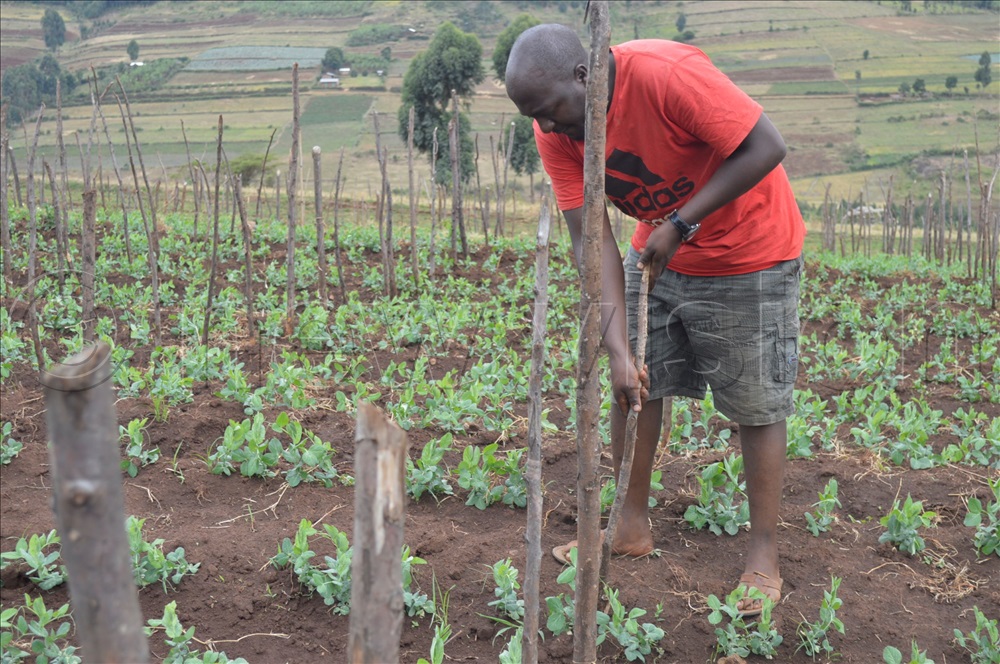By Umar Nsubuga
Horticulture is becoming a key driver of agricultural growth, particularly for smallholder farmers seeking to diversify their crops and boost income.
Isaac Malinga, a famous farmer from Kapchorwa, has made a name for himself by mastering horticulture and helping others adopt it in their farming practices.
With his experience in growing various vegetables, Malinga provides essential tips on how horticulture can gain ground and why it’s an increasingly important sector for farmers across Uganda.
Horticulture offers numerous advantages over traditional crops, particularly for farmers in regions like Kapchorwa, which boasts fertile soils and favourable weather.
According to Malinga, horticulture is a reliable alternative because it provides food security, responds well to market demand and a farmer consistently earns.
“Horticultural crops such as tomatoes, onions, and cabbages have shorter growth cycles, meaning farmers can harvest and sell multiple times a year,” says Malinga.
“This creates more cash flow compared to long-term crops like maize or beans.”

Moreover, fruits and vegetables fetch premium prices in both local and international markets, especially during off-seasons, offering greater profitability.
Market research
One of Malinga’s strongest pieces of advice is to know the market before planting any crops.
“It’s important to understand what consumers want and when they want it,” he advises.
“Study local market trends, and consider the needs of nearby cities and towns,” he adds.
Farmers should identify fruits or vegetables that have a steady demand but are not oversupplied. In Uganda, Malinga has found that crops like onions, tomatoes, and bell peppers tend to perform well in the market, especially during certain times of the year when supply is low, and prices are higher.
Embrace modern irrigation techniques
In Kapchorwa, where Malinga farms, water is often abundant, but he insists that effective water management remains key.
He recommends farmers implement irrigation systems like drip irrigation, which ensures crops get the right amount of water without waste.
“Drip irrigation is efficient, especially for farmers with limited water access. It helps save water while keeping plants hydrated,” he explains.
Diversify your crops
Malinga encourages diversification to mitigate risk. Growing a variety of fruits and vegetables ensures that if one crop underperforms due to pests or market fluctuations, others can still bring in income.
“You don’t want to rely on just one crop. I grow tomatoes, onions, and cabbages, and each has its peak season when it sells best,” Malinga shares.
Diversifying also helps maintain soil fertility. Rotating crops reduces the chance of depleting the soil and minimizes pest outbreaks, which can be common in monocropping, he explains.
Adopt proper crop management practices
To ensure high yields, Malinga stresses the importance of adopting proper crop management techniques. This includes timely planting, weeding, and applying fertilisers.
“Horticulture is intensive. You need to monitor your crops daily,” he says.
Pest and disease control is another critical aspect. Malinga advises using organic pesticides or integrated pest management techniques to reduce damage without harming the environment.
“Regular scouting of the crops can prevent pest outbreaks before they become major problems,” he explains.
Value addition and post-harvest handling
One of the biggest challenges in horticulture is post-harvest losses due to poor handling or lack of storage. Malinga suggests farmers focus on value addition by processing their produce.
“Instead of selling fresh tomatoes, consider making tomato paste or drying them. This extends the shelf life and adds value to the product,” he says.
Proper storage is also essential to prevent spoilage. Malinga recommends using cooling facilities or low-cost storage methods to keep fruits and vegetables fresh for longer periods.
Collaborate and seek training
Horticulture farming requires continuous learning. Malinga urges farmers to collaborate with others and seek training from agricultural extension officers or organizations that offer technical support.
“Farming is not static. There are always new techniques and technologies to learn, especially in horticulture, where innovation is key,” he advises.
By attending workshops, farmers can learn about modern farming techniques, sustainable practices, and market access strategies, all of which can significantly improve their outcomes.





